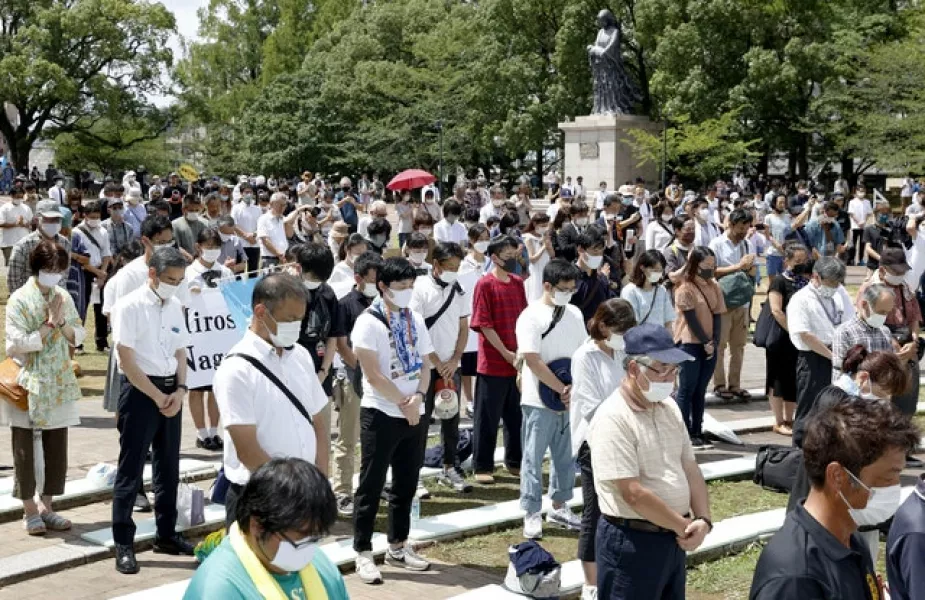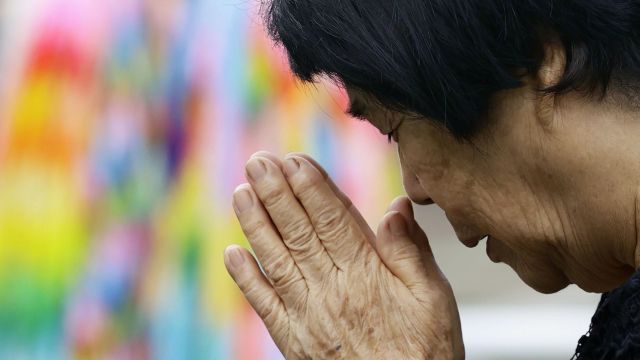At 11:02am, the moment the B-29 bomber Bockscar dropped a 4.5-ton plutonium bomb dubbed Fat Man, Nagasaki survivors and other participants stood in a minute of silence to honour more than 70,000 people dead.
The August 9, 1945, bombing came three days after the US dropped its first atomic bomb on Hiroshima, the world’s first ever nuclear attack, that killed 140,000. On August 15, Japan surrendered, ending World War II.
At a commemoration in Nagasaki Peace Park – scaled down because of the coronavirus pandemic – Mayor Tomihisa Taue read a peace declaration in which he raised concern that nuclear states had in recent years retreated from disarmament efforts.
Instead, they were upgrading and miniaturising nuclear weapons for easier use, he said.

Mr Taue singled out the US and Russia for increasing risks by scrapping the Intermediate-Range Nuclear Forces Treaty.
“As a result, the threat of nuclear weapons being used is increasingly becoming real,” Mr Taue said.
He said the “true horror of nuclear weapons has not yet been adequately conveyed to the world at large” despite efforts by Japan’s atomic bombing survivors to ensure Nagasaki is the last place to suffer such an attack.
He also urged Japan’s government and lawmakers to quickly sign the 2017 Treaty on the Prohibition of Nuclear Weapons.

Prime Minister Shinzo Abe has repeatedly refused to sign the treaty, saying Japan’s approach is not to take sides but to serve as a bridge between nuclear and non-nuclear states to encourage dialogue to achieve a total nuclear ban.
Survivors and pacifist groups say Japan is virtually siding with the US and other nuclear states.
“Among the nuclear-weapon states and countries under the nuclear umbrella, there have been voices stating that it is too early for such a treaty. That is not so,” Mr Taue said.
“Nuclear arms reductions are far too late in coming.”
On Sunday, Mr Abe repeated Japan’s position, citing “severe national security environment and a wide gap between the two sides on nuclear disarmament”.

While Tokyo renounces its own possession, production or hosting of nuclear weapons, as a US ally Japan hosts 50,000 American troops and is protected by the US nuclear umbrella.
The post-WWII security arrangement complicates the push to have Japan sign the treaty as it beefs up its own military to deal with threats from North Korea and China, among others.
An ageing group of survivors have expressed a growing sense of urgency to tell their stories, in hope of reaching younger generations to continue their effort toward establishing a nuclear-free world.
I'm determined to keep telling my story so that Nagasaki will be the last place on Earth to have suffered an atomic attack
“There is not much time left for us survivors,” said Shigemi Fukabori, 89, in a speech at the ceremony. He was a 14-year-old student mobilised to work at a shipyard when Nagasaki was bombed.
“I’m determined to keep telling my story so that Nagasaki will be the last place on Earth to have suffered an atomic attack.
“We don’t want anyone else to have to go through this.
“Nagasaki bears a responsibility as a witness of catastrophic results the nuclear weapon caused to humanity and environment.
“I hope as many people as possible join us, especially the young generations to inherit our baton of peace and keep running.”
Many peace events, including survivors’ talks leading up to the anniversary, were cancelled because of the coronavirus, but some survivors have teamed with students and pacifist groups to speak at online events.







